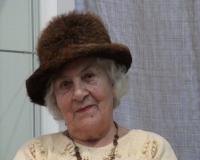I think there was more love and harmony among people back then. We had more respect for each other. That’s what I really miss these days

Download image
Alžbeta Váradiová was born in 1924 in Nové Zámky into the family of a railway ticket inspector. She was raised in a spirit of Christianity and led to love people regardless of their nationality and religion. Before her hometown was ceded to Hungary in 1938, she had been unaware of any ethnic conflicts between Slovaks and Hungarians living in the town; however, the Vienna Award changed everything. After the arrival of Hungarian troops in the town, the Slovak population had to get used to new living conditions. Local clerks were replaced by the Hungarian ones, but Alžbeta does not recall any problems with communication in the offices. She attended the state municipal school, which was closed shortly afterwards, so she as well as other students had to continue studying in the so-called Flengerka. In 1944, several tragic events happened in Nové Zámky. Firstly, the Jewish community living in the town and in the surrounding villages was crammed into the local ghetto, which became their last stop before being deported to Auschwitz in June 1944. Then, in October, the town of Nové Zámky became a target for the two bomb attacks; however Alžbeta’s family managed to prepare for it at least to a certain extent and had a shelter. The last bombing occurred on March 14, 1945, only a few days before liberation. These attacks claimed thousands of victims and left the town completely destroyed. At that time Alžbeta was finishing school, so she passed the leaving examinations in 1945. Then, she left for Bratislava to study at the Pedagogical Academy and became a geography and art teacher. She successively worked at various schools around Slovakia - in Kysucký Lieskovec, in the village of Lodno, in Kysucké Nové Mesto, later in Šípkovo near Bánovce nad Bebravou, and finally in Nové Zámky, where she taught at the school for boys. She enjoys the afternoon of her life in retirement.
